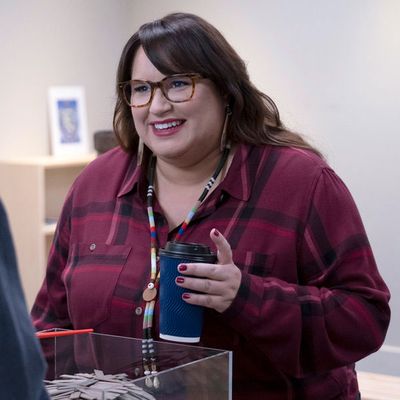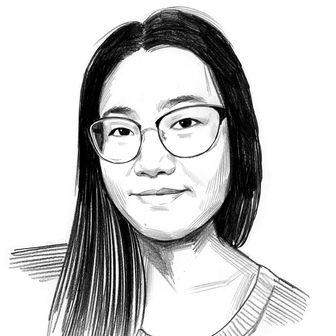
Jana Schmieding says there’s a dark running joke in the Native screenwriting community: If a Native woman is onscreen, she’s usually dead by the end of the first act. So Schmieding, who is Lakota Sioux, jumped at the chance to be in the new comedy Rutherford Falls and play Reagan Wells, a Native character who is decidedly full of life (and, in the words of series co-creator Sierra Teller Ornelas, “auntie vibes”). Schmieding also writes for the show, which premiered on Peacock last week. As Reagan, she plays a woman who hopes to honor the history of her (fictional) Minishonka tribe through a museum, even as she struggles to be accepted by the community on the reservation. She’s also a supportive best friend to town founder’s descendant Nathan Rutherford (Ed Helms); a career-driven employee to casino owner Terry Thomas (Michael Greyeyes); and a bashful love interest to reporter Josh Cogan (Dustin Milligan).
It’s hard to tell this is Schmieding’s first major role — her background in comedy and improv serves her well when cracking jokes, but she also deftly navigates charged scenes that grapple with who gets to control the narrative of American history. After the ten-episode season dropped, the new star sat down with Vulture to discuss her onscreen relationship with Dustin Milligan, Ed Helms’s face-acting tips, and the importance of creating imperfect characters.
Some light spoilers below.
First, congratulations on Rutherford Falls being out in the world! Are you the type of person who will be checking the internet to see how people react?
Yes, unfortunately I am. People are like, “Don’t read the comments,” and I am a masochist, I don’t know what’s wrong with me. I gotta try my hardest to keep my phone down a little bit today.
I mean, you taught public school for a decade, so I feel like you could handle it.
[Laughs] Yeah. The toughest crowds, my students in the Bronx.
Sierra Teller Ornelas, one of the showrunners, has described Reagan as a character who has auntie vibes. What does that mean to you?
Aunties are sort of revered in the Native community as women who often don’t necessarily have their own kids, but they help to raise all the other kids in the community. They’re like the cool mom, the mom alternative. The ones who will teach you how to shave your legs and buy you beer sometimes, before you’re 21. [Laughs.] Native communities very much function as villages, and traditionally, the role of parenting is not just bound to a mother and a father … [Reagan’s] personality is such that she just wants to take care of people, she wants to take care of her friends.
You say in one of your stand-up sets that because of your body, you can’t play the sort of hypersexualized Native heartbreaker casting directors often want. How did it feel to be the love interest in this show for Dustin Milligan’s character, Josh?
It was an interesting challenge for me. Women of size and fat women onscreen are not given any kind of autonomy, they’re not really given any character beyond “funny” or “clumsy.” And if we see them having love and romance onscreen, it is often because of some crazy event, like they got knocked out. In a lot of fat-justice circles, there’s discussion about how, basically, if a fat woman has love onscreen, it is because of a magical circumstance. A lot of those messages, I’ve internalized. I didn’t really realize until I was confronted with the role. I was like, “Oh my God, I have to be rom-com-y,” an idea that I’ve kind of rejected for myself … In the lives of many, many people of size, romance is happening. This is just a fabrication of Hollywood, the predominant narrative that courses through Hollywood. In our lives, we snag, we get hotties! Like, we can, you know?
I kind of asked Sierra about it, I was like, “Are you sure you want to give Reagan this romantic story line?” And she was like, “We’re saying something without saying something, it’s fine. Of course she has a romantic story line, she’s cute!” And I was like, “Okay. [Laughs.] You’re right.” And of course, doing it with Dustin — he’s a wonderful person, and a friend off-screen. He also understands what I’m dealing with, in terms of the pressure and the anxieties around it, and just really helped me handle this story line with care and real love.
I love that while Reagan gets dunked on for a lot of things in the show, there’s never any fat-shaming.
Yeah, not at all. And there never will be.
You also co-star alongside Ed Helms. What was it like acting with him? You’ve called him one of your comedy heroes.
He is, and oh my gosh, I just have to show you this, he’s calling me right now! Ed Helms is calling me on my phone right now! Ahhhhhh! I get very emotional when I talk about working with Ed. I’ve been watching Ed Helms on TV since I could watch him on TV. He was an incredible mentor and friend to have as a first time being onscreen to this extent. On one of the first days, he said, “If you have bits or ideas or you want to improvise, you can either let me know, or I’ll rock with it when it happens.” The way that he kind of engages in a scene, and the way that he sets up his jokes, and then will try it again and again — just his techniques and stuff, I watched with laser focus.
He does this thing where he will do a scene, and then he will leave and go to the monitor and he’ll watch the playback of the scene. I asked him, “Why do you do that?” And he said, “I have realized over the course of my career that my face isn’t always doing what I think it’s doing. My expression doesn’t always match what’s happening internally, so I like to occasionally go and check to see that it is doing that.” Little things like that, I was like, God, I’m learning this industry from a person who has so much experience and a wealth of knowledge, and also is such a loving person and a funny actor and a good actor. So yeah, I get flummoxed when I talk about working with Ed.
Do you remember improvising any scenes with him?
Not full scenes, but they always let you throw in a little bit of improv here and there. I think working in the Mike Schur world, you’re going to encounter a lot of opportunities to improvise. That’s just sort of the style of comedy that the show brings forward. And that’s perfect for me because I did improv comedy for ten years, performing with several different groups in New York. I think ultimately, good improv relies on rapport and relationship with your scene partners. And because Ed and I had worked in the writing room together, it wasn’t our first time encountering each other. By the end of the shoot schedule, we were really letting it fly, so it was so fun.
You two have a lot of lighthearted scenes together, but also some pretty intense moments. I’m thinking of episode seven, where Nathan and Reagan fight — she asks him why his history is more important than hers. How did you feel shooting that argument?
I was so excited for that day because I’m a performer at my core, and I know Ed is too. And there’s something very fulfilling after doing comedy, comedy, comedy, taking it to a realistic place and to have those dramatic moments where you’re really employing a different part of your technique and a different part of your skill. It’s important that we see the way that this narrative shift is happening to these two friends who are very close. We’re giving the audience a chance to say, yeah, some friendships might not survive this kind of paradigm shift, and this adherence to a certain philosophy or narrative.
In the season finale, they reconcile over the phone and Reagan tells him the world isn’t divided into people who are fully enlightened or stupid, and that change is hard even when it’s good. Did that resonate with you as you were writing or acting it?
Absolutely, absolutely. I think something that we were really trying to nail in the writing of this show as a room was understanding that we as individuals, especially now, in our culture, are holding many truths at once. There’s nuance to everything. We have resistances, but we can let them go, it’s actually a normal part of being a human being. When you’re giving characters just one situation to react to and then you’re determining that they’re good or bad, then you really have nothing to play with in this world that you built. Each character in Rutherford Falls or in the Minishonka Nation, we could see an episode — or a season — all about them. We are all very multifaceted, and we have many experiences behind us. So ultimately that was the intent, and performing it was wonderful. It was a situation where Ed was very busy. He had other things going on, but he came to set for that one phone-call scene, so that we could do it live, and he could read his side of the conversation to feel like we were really having a friendship moment. That meant so much to me.
What was it like filming your first major role during a pandemic?
I don’t know any other way, I’ll say that. Everybody kept being like, “Oh, bummer that your first experience is happening during this really intense time.” And I’m like, “Yeah, tell me, what’s it like otherwise?” And they’re like, “We have food trucks.” So we didn’t have food trucks, I guess. [Laughs.] But no, ultimately, it was a lot. The network and the studio and the producers were so diligent about making sure that everybody was testing every day. When we had spikes in Los Angeles, we shut down. Safety was an utmost concern, especially because we had a lot of Native talent coming onto this show, and COVID-19 hit Indian country really hard. We were not trying to bring folks from their reservations and expose them and send them back to their tribal communities. That was at the forefront of our minds as a Native show.
What kinds of roles would you want to take on next?
Oh my gosh, I would love to [do] Shakespeare, I would love to be in a crime drama. I would love to continue to do comedy. I mean, I follow the work of Melissa McCarthy and Kristen Wiig, and I would love to do all of the things that white women in comedy get to do. And I think I can. I hope I can!
This interview has been edited and condensed.


